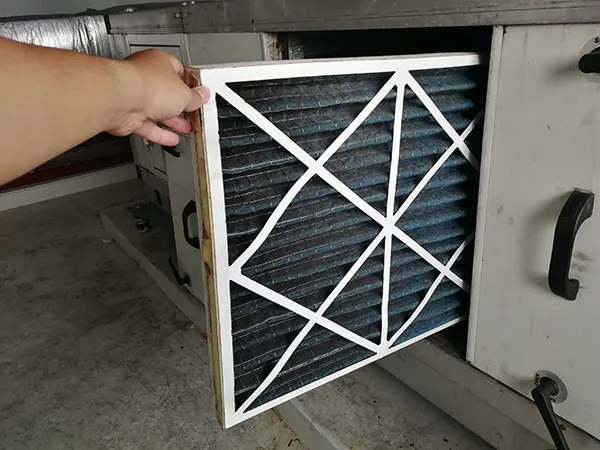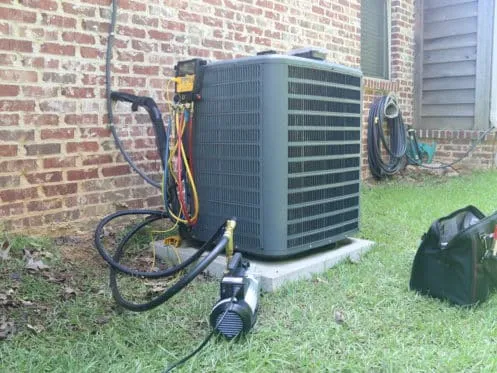
You have likely heard that if you have an HVAC system, you should be concerned about mold growth. This is because the presence of mold or mold spores in your AC unit will negatively affect the air quality in your home. It can also bring along a myriad of health complications for your family, especially for people in the household suffering from mold allergies. This means that you will have a tougher time enjoying the comfort of your home, and you might also have to deal with frequent expensive medical bills. Once you notice that there might be mold growing inside your HVAC system, you should promptly contact a reputable AC technician to come and get rid of it.
What Makes Mold Grow in Your Air Conditioner?
There are always mold spores floating in the air outside and inside your home, looking for favorable conditions to grow into mold. Mold requires moisture, near darkness, warmth, still air, and organic food to grow. The organic food source can be particles of carpet, wood, dead skin, and any other organic matter found in dust that collects in your HVAC system. Mold can’t grow on the metal sheet or Styrofoam ducts of your HVAC systems without having an organic food source to anchor it down.
A perfectly working and well-maintained air conditioner typically lacks most of the requirements for mold growth. However, once some part of your AC unit malfunctions, the perfect conditions for mold growth are created. For instance, a clog in the condensate drain can result in water backing in the unit, encouraging mold growth. Moreover, mold can also grow in air conditioning systems that haven’t been switched on for a long time.
How Can You Tell If Mold Is Growing in Your Air Conditioner?
Mold in your HVAC system will look similar to other molds you might find anywhere else in your home. There are usually numerous telltale signs that mold is colonizing your AC unit.
Some key telltale signs include:
- The presence of a “mildewy” or musty odor
- The buildup of black dust around the air vents
- A visible presence of mold anywhere on your HVAC system
Keep in mind that the “mildewy” or musty smell can be coming from the carpet, kitchen, or any other mold-infested things in your home. Therefore, make sure you check for other probable sources of the musty odor before concluding that it’s from your AC unit.
Is Mold in an AC Unit Dangerous?
If you suspect the presence of mold in your AC unit, this should be cause for concern. While the mold in your unit might not be the dreaded black mold, all kinds of molds can cause respiratory problems and other health complications. Children, the elderly, and persons with asthma, mold allergies, or compromised immunity are at a greater risk of developing health complications due to the presence of mold in the air conditioner.
If someone in your household has recently experienced a change in health for no apparent reason, it would be wise to have your HVAC system checked for the presence of mold.
Symptoms to look out for that may be an indication of mold growth in your home are:
- Wheezing
- Sore throat
- Itchy or irritated skin
- Watery eyes
- Congestion
- Increased sneezing
- Aggressive coughing
How to Eliminate Mold From Your Air Conditioner
Now that you have suspicions that there is mold in your AC unit, you are likely thinking about how to get rid of it. Firstly, turn off the AC unit to minimize the number of mold spores released into your home. You shouldn’t try to clean the mold by yourself. This is because there might be more mold growing in hard-to-reach areas of your HVAC system, like the air ducts that you wouldn’t be able to clean. Furthermore, you can expose yourself to excessively high levels of mold spores during the cleaning, leading to health complications.
Go ahead and call an experienced HVAC technician to handle the cleanup so that no mold is left behind. The sooner you call the HVAC technician to do the cleanup, the better. Keep in mind that mold grows really fast, and the longer you wait, the more compromised your air quality will be, and the more amplified the negative health effects of the mold.
The HVAC technician will disassemble the AC unit to clean the mold from the coils, evaporators, internal air ducts, and other parts. The technician will also vacuum and clean the entirety of the ducts. Additionally, the AC technician will fix any HVAC system malfunction that might encourage mold growth.
How to Prevent Mold Growth in Your HVAC System
As a heating and air services company dedicated to promoting the well-being of our clients and the community as a whole, we have some pro tips that can help you prevent mold growth in your HVAC system. You should know that controlling moisture is central to preventing mold growth in AC. Sadly, AC units commonly generate moisture. To limit moisture when utilizing your HVAC system, we recommend that you ensure the doors and windows in your home fit tightly to stop excess humid outdoor air or rain from getting inside.
On top of that, the grates, air returns, and filters should be cleaned frequently to prevent dust buildup, which can hinder airflow or avail a food source for mold.

Moreover, this will allow the HVAC ducts to self-regulate moisture using airflow. When doing this cleaning, use a vacuum cleaner, not a damp cloth and water, which can increase the humidity level in the ducts. Moreover, as an air conditioner cools humid air, water vapor present in the air condenses into water droplets, typically on windows. The windows should be opened slightly outward for the condensation to drain outside.
Additionally, if your AC unit lacks drainage systems, ask the HVAC technician to install one leading to the drain tile. The drainage systems will stop moisture from collecting around the unit and entering the ducts. Regularly clean the drainage systems to prevent them from getting clogged by debris or buildup. Failure to clean the drainage system can result in flooding in your house. Furthermore, periodically empty your portable AC unit as instructed by the manufacturer. Some portable AC units have lights that indicate when the reservoir is full and needs to be emptied. Ensure you empty your portable AC before storing it for winter. Finally, call an HVAC technician to periodically service your HVAC system to ensure it constantly functions in tip-top form.
Need Heating and Air Services in Santa Clarita and Antelope Valley?
Welcome to [company name], reputable heating service and cooling service provider serving Santa Clarita and the Antelope Valley. We have years of expertise installing and servicing heating systems for both residential and business establishments. Additionally, we do remodels and install and service air purifiers, humidifiers, dehumidifiers, UV lights, and more.
We will help you find effective solutions for reducing your energy bills by conducting a comprehensive cost-benefit analysis. At [company name], we are committed to providing unbeatable services to our clients. All our technicians are highly trained, and we offer a 100% satisfaction guarantee. We have easy financing solutions available on approved credit for clients on a tight budget.








